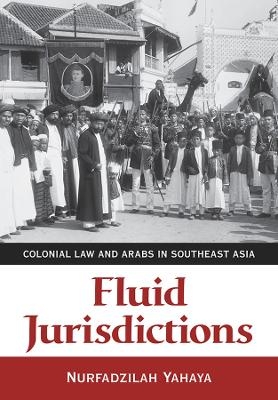
Fluid Jurisdictions
Colonial Law and Arabs in Southeast Asia
Seiten
2022
Cornell University Press (Verlag)
978-1-5017-6464-6 (ISBN)
Cornell University Press (Verlag)
978-1-5017-6464-6 (ISBN)
This wide-ranging, geographically ambitious book tells the story of the Arab diaspora within the context of British and Dutch colonialism, unpacking the community's ambiguous embrace of European colonial authority in Southeast Asia. In Fluid Jurisdictions, Nurfadzilah Yahaya looks at colonial legal infrastructure and discusses how it impacted, and was impacted by, Islam and ethnicity. But more important, she follows the actors who used this framework to advance their particular interests.
Yahaya explains why Arab minorities in the region helped to fuel the entrenchment of European colonial legalities: their itinerant lives made institutional records necessary. Securely stored in centralized repositories, such records could be presented as evidence in legal disputes. To ensure accountability down the line, Arab merchants valued notarial attestation land deeds, inheritance papers, and marriage certificates by recognized state officials. Colonial subjects continually played one jurisdiction against another, sometimes preferring that colonial legal authorities administer Islamic law—even against fellow Muslims.
Fluid Jurisdictions draws on lively material from multiple international archives to demonstrate the interplay between colonial projections of order and their realities, Arab navigation of legally plural systems in Southeast Asia and beyond, and the fraught and deeply human struggles that played out between family, religious, contract, and commercial legal orders.
Yahaya explains why Arab minorities in the region helped to fuel the entrenchment of European colonial legalities: their itinerant lives made institutional records necessary. Securely stored in centralized repositories, such records could be presented as evidence in legal disputes. To ensure accountability down the line, Arab merchants valued notarial attestation land deeds, inheritance papers, and marriage certificates by recognized state officials. Colonial subjects continually played one jurisdiction against another, sometimes preferring that colonial legal authorities administer Islamic law—even against fellow Muslims.
Fluid Jurisdictions draws on lively material from multiple international archives to demonstrate the interplay between colonial projections of order and their realities, Arab navigation of legally plural systems in Southeast Asia and beyond, and the fraught and deeply human struggles that played out between family, religious, contract, and commercial legal orders.
Nurfadzilah Yahaya is Assistant Professor in the Department of History at the National University of Singapore. Follow her on X @nfyahaya.
Introduction: Establishing Legal Domains
1. The Lure of Bureaucracy: British Administration of Islamic Law in the Straits Settlements
2. Surat Kuasa: Powers of Attorney across the Indian Ocean
3. Resident Aliens: Exclusions of Arabs in the Netherlands Indies
4. Legal Incompetence: Jurisdictional Complications in the Netherlands Indies
5. Constructing the Index of Arabs: Colonial Imaginaries in Southeast Asia
6. Compromises: The Limitations of Diasporic Religious Trusts
Conclusion: Postcolonial Transitions
| Erscheinungsdatum | 21.02.2022 |
|---|---|
| Zusatzinfo | 3 Maps; 2 Graphs; 5 Halftones, black and white |
| Verlagsort | Ithaca |
| Sprache | englisch |
| Maße | 152 x 229 mm |
| Gewicht | 454 g |
| Themenwelt | Geisteswissenschaften ► Religion / Theologie ► Islam |
| Recht / Steuern ► EU / Internationales Recht | |
| Recht / Steuern ► Öffentliches Recht ► Verfassungsrecht | |
| Sozialwissenschaften ► Politik / Verwaltung | |
| ISBN-10 | 1-5017-6464-0 / 1501764640 |
| ISBN-13 | 978-1-5017-6464-6 / 9781501764646 |
| Zustand | Neuware |
| Haben Sie eine Frage zum Produkt? |
Mehr entdecken
aus dem Bereich
aus dem Bereich


